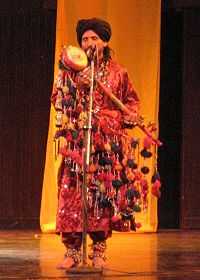Saieen Zahoor
Saieen Zahoor Perform his first concert in the age of 10 when he went in a marriage of a famous family Manika .
| Sain Zahoor | |
|---|---|
 | |
| Background information | |
| Born |
Okara, Pakistan born 1937 |
| Origin | Okara, Pakistan |
| Genres | Folk |
| Occupation(s) | Musician, singer |
| Instruments | Ektara, Tumbi |
| Labels | Pakistan – Coke Studio |
Saieen Zahoor or Saeen Zahur Ahmad (Urdu: سائیں ظہور) (Punjabi: ਸੈਨ ਜ਼ਹੂਰ) (born circa 1937) is a leading Sufi musician from Pakistan. He has spent most of his life singing in Sufi shrines, and didn't produce a record until 2006, when he was nominated for the BBC World Music awards based on word of mouth.[1] He emerged as the "best BBC voice of the year 2006",[2] Sain is not his first name but a Sindhi honorific title and is also spelt Saeen or Sain, and Zahoor may be spelt Zahur.
Life
Born in the Okara district of the Sahiwal region in the province of Punjab, Pakistan, Zahoor was the youngest child in a rural peasant family. He is said to have started singing at the age of five,[2] and from that early age, he had dreamt of a hand beckoning him towards a shrine. He left home at the age of ten, roaming the Sufi shrines of Sindh, Punjab, making a living through singing. Zahoor claims that as he was walking past a small shrine in the south Punjab town of Uch Sharif (known for its Sufi traditions), when "someone waved at me with his hand, inviting me in, and I suddenly realised that it was this hand which I saw in my dream."[3]
For some time, he studied music under Raunka Ali of Patiala Gharana, whom he met at Bulleh Shah's dargah (shrine), and who became his first teacher for Sufi verses. He also studied music with other Uch Sharif-based musicians.
Although not literate, Zahoor is known for his memory of song lyrics; mostly he sings compositions of the major Sufi poets, Bulleh Shah, Shah Badakhshi, Muhammad Qadiri others. Sain is famous for his performances at Coke studio. His upcoming Projects are in Australia and New Zealand in October & November 2014.
Musical style
For most of his life Zahoor performed mainly in dargahs (Sufi tombs/shrines) and festivals, and in the streets. He adopted the folk instrument Ektara (ek= one, tar = string), in its three-stringed version called Tumbi, as his main instrument. Like some traditions of Sufi music, he has a passionate, high-energy style of singing, often dancing in a frenzied style with the tassels on his instrument whirling around him. His typical outfit includes embroidered (kurta), beads, tightly bound turban, as well as ghungroos (anklet-bells worn by dancers). His voice has an earthy tone, almost cracking at the edges, but capable of a wide vocal and emotional range.
In 1989 he performed on a concert stage for the first time at the All Pakistan Music Conference,[2] which brought him into musical prominence. Subsequently he has emerged as a leading performer in Pakistan, frequently appearing on TV and in concerts. Zahoor has also given concerts in UK, Japan,[4] Ireland,[5] India, Canada and Norway.[6]
Sufi singing is focused on poetry with themes of devotional love, which shares much with Persian mystic poets like Rumi and with other South Asian traditions such as the Bhakti cult. Sufi traditions highlight a softer, multi-cultural aspect of Islam, and are seen as a countering "the extremism of the mullahs who use the mosques to spread ill-will" against other cultural groups, according to some organizers of Saieen Zahoor's concerts.[1]
In 2006 Zahoor released an album titled Awazay ("Sounds") through Matteela Records.[3] In 2007 he helped produce the soundtrack to the Pakistani film Khuda Ke Liye.
He sang an ost in 2011 for West Is West a British comedy-drama film, which is a sequel to the 1999 comedy East Is East. He also acted and appeared in the film.[7]
Songs
- Toomba (Coke Studio Season 2)
- Allah Hoo
- Nachna Painda Hai
- Tere Ishq Nachaya
- Ek Alif (Coke Studio Season 2)
- Allah Hu (Coke Studio Season 6)
- Rabba Ho (Coke Studio Season 6)
Films
His music has been used in the following films
- West is West (2010) – Toomba and Ek Alif
References
- ↑ 1.0 1.1 Robin Denselow (2 December 2005). "Sufi's choice". The Guardian. Retrieved 8 May 2007.
- ↑ 2.0 2.1 2.2 Ivan Chrysler. "Winner BBC Music Awards 2006: Sain Zahoor (Pakistan)". British Broadcasting Corporation. Retrieved 8 May 2007.
- ↑ 3.0 3.1 "Saieen Zahoor: the roving minstrel". Matteela Music. Retrieved 8 May 2007.
- ↑ "Folk Music Performance: Pakistan Pavilion [PDF]". Aichi Expo 2005 website. Retrieved 9 May 2007.
- ↑ "Festival of World Cultures, Dublin 2009". Retrieved 31 August 2009.
- ↑ @Mela 2011
- ↑ "sain zahoor brings the soul of sufi to west".
External links
Saeen Zahoor has sung at Sufi shrines for decades
